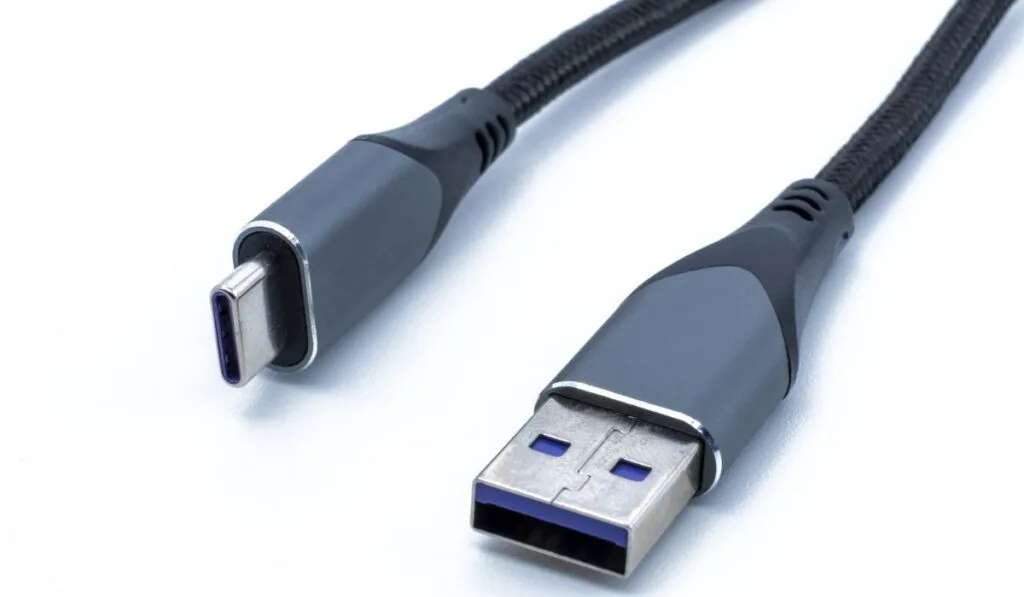With so many different devices, manufacturers, and specifications, you might wonder, “Are all USB-C cables the same?” Unfortunately, like other products, not all USB-C cables are created equal and different models will have the best use cases.
Not all USB-C cables are the same, with varying charging speeds and data transfer rates. For a standard USB-C to USB-C model, look for 3.1 or 3.2 options with 5Gbps to 10Gbps if you need faster data transfer speeds. Cables with non-USB-C ports on one end will probably have slower data and charging.
There’s a lot to consider regarding USB-C cables and charging options. However, figuring out which choices suit your needs can be tricky if you aren’t sure what to look for. Thankfully, we cover everything you need to get you started in the article below.
Are All USB-C Cables the Same?

You might be wondering about the differences between a premium USB-C cable and a cheap generic model. Although nearly any option will work, there are a few considerations before purchasing.
Physical Differences
As you can imagine, different USB-C cables will have varying physical differences. For example, some wires are thicker, heavier, and longer than other options. In addition, different USB-C cables might have additional weight from the sheathing and wires inside.
You can find cables ranging from 3 to 6 feet, which might also impact transfer speeds. You might prefer thinner and less robust cords, depending on your tastes.
Charging Performance and Speed
The charging performance is another consideration to keep in mind. Most USB-C cables charge devices at the same speed, up to 60W. In addition, these cables support 3A currents, sufficient to power most USB-C devices.
However, some USB-C cables support 5A of current, allowing them to charge larger devices. For example, USB-C cables that support 5A of current can charge 65-100W devices, like 15-inch laptops.
A 3A cable won’t work as well with a 65-100W device. The only downside is that 5A cables tend to be more expensive than other options.
Data Transfer Rates
Different cables are going to have varying data transfer speeds. Some options will have painfully slow transfer rates, making them a pain to use. Some key points to consider include:
- USB 2.0: 480 Mbps (megabits per second)
- USB 3.0: 5 Gbps (gigabits per second)
- USB 3.1 Gen 1: 5 Gbps
- USB 3.1 Gen 2: 10 Gbps
USB-C cables advertised as “full-featured” typically mean USB 3.1 Gen 2 with 10 gigabits of transfer speed. However, you’ll want to check the specifications for any product before you purchase.
What are the Different Types of USB-C Cables?

There are a few different options when it comes to selecting USB-C cables. You can choose between speed capabilities and data transfer options, besides physical differences like the cable length. Here are a few different types of USB-C cables to keep in mind:
- USB-A to USB-C
- USB-C to USB-C
- USB 2.0
- USB 3.0
- USB 3.1 Gen 1
- USB 3.1 Gen 2
Protocols and Alternate Modes
Some USB-C cables support different protocols for transferring data. These protocols are known as alternate modes in the world of USB-C cables.
One protocol option may give support for another, but it isn’t common. Here are some data transferring options to consider:
- MHL (Mobile High-Definition)
- HDMI
- Thunderbolt 3
- DisplayPort
Depending on your circumstance, you might need a USB-C cable compatible with HDMI or Thunderbolt 3. Again, read all the product specifications before selecting a model.
How to Choose the Right USB Cable
As you know, there’s a lot to consider when selecting the correct USB cables for your needs. Here’s some essential advice to get you started.
Go with USB-C to USB-C
Choosing a USB-C to USB-C cable (on Amazon) is best if you want the highest charging speeds. Opt for models with a high-wattage USB-C charger.
These types of cables use an open USB-Power Delivery standard. Most devices will benefit from USB-C to USB-C chargers if plugged into a 30-watt, 60-watt, or 100-watt charger.
Look for Higher Data Transfer Speeds
It’s best to look for USB-C to USB-C cables for data transfers. Look for models with USB 3.1 or USB 3.2 at rates of 5Gbps or 10Gbps.
Other options, like a USB 2.0 cable (on Amazon), can take over 70 seconds to transfer files. A more robust USB 3.2/10Gbps model can take around 4 seconds.
Do You Really Need a 100-Watt Cable?
In most cases, you don’t need a 100-watt cable (on Amazon), depending on the charger or laptop. For instance, some laptops benefit and use all 100 watts. Other models will ship with a 45-watt or 60-watt USB-C charger and don’t benefit from the added power.
A 60-watt cable (on Amazon) will work fine if you’re looking for a replacement USB-C to USB-C cable that works for most devices.
